 在软件系统演进过程中,随着业务规模的增长 (TPS/存储容量),通过集群化部署来分摊计算、存储压力。应用服务的无状态设计使其具备了伸缩性。通过 ShardingSphere + CosId 实现分库分表方案,为单点数据库分摊压力,提升系统性能与可用性。
在软件系统演进过程中,随着业务规模的增长 (TPS/存储容量),通过集群化部署来分摊计算、存储压力。应用服务的无状态设计使其具备了伸缩性。通过 ShardingSphere + CosId 实现分库分表方案,为单点数据库分摊压力,提升系统性能与可用性。

在软件系统演进过程中,随着业务规模的增长 (TPS/存储容量),我们需要通过集群化部署来分摊计算、存储压力。
应用服务的无状态设计使其具备了伸缩性。在使用 Kubernetes 部署时我们只需要一行命令即可完成服务伸缩
(kubectl scale --replicas=5 deployment/order-service)。
但对于有状态的数据库就不那么容易了,此时数据库变成系统的性能瓶颈是显而易见的。
分库分表从微服务的角度来理解垂直拆分其实就是微服务拆分。以限界上下文来定义服务边界将大服务/单体应用拆分成多个自治的粒度更小的服务,因为自治性规范要求,数据库也需要进行业务拆分。
但垂直拆分后的单个微服务依然会面临 TPS/存储容量 的挑战,所以这里我们重点讨论水平拆分的方式。
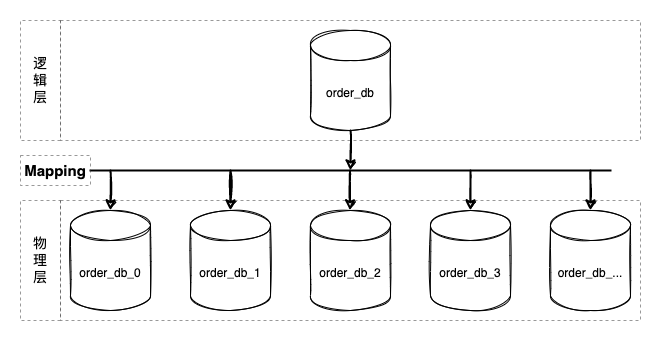
数据库分库分表方案是逻辑统一,物理分区自治的方案。其核心设计在于中间层映射方案的设计 (上图 Mapping),即分片算法的设计。
几乎所有编程语言都内置实现了散列表(java:HashMap/csharp:Dictionary/python:dict/go:map ...)。分片算法跟散列表高度相似(hashCode),都得通过 key/shardingValue 映射到对应的槽位(slot)。
那么 shardingValue 从哪里来呢?CosId!!!
CosId 旨在提供通用、灵活、高性能的分布式 ID 生成器。CosId 目前提供了以下三种算法:
SnowflakeId: 单机 TPS 性能:409W/s , 主要解决 时钟回拨问题 、机器号分配问题 并且提供更加友好、灵活的使用体验。SegmentId: 每次获取一段 (Step) ID,来降低号段分发器的网络IO请求频次提升性能,提供多种存储后端:关系型数据库、Redis、Zookeeper 供用户选择。SegmentChainId(推荐):SegmentChainId(lock-free) 是对SegmentId的增强。性能可达到近似AtomicLong的 TPS 性能:12743W+/s。
shardingValue 问题解决了,但这就够了吗?ShardingSphere!!!
ShardingSphere摘自 CosId 官网:https://github.com/Ahoo-Wang/CosId
Apache ShardingSphere 是一款开源分布式数据库生态项目,由 JDBC、Proxy 和 Sidecar(规划中) 3 款产品组成。其核心采用可插拔架构,通过组件扩展功能。对上以数据库协议及 SQL 方式提供诸多增强功能,包括数据分片、访问路由、数据安全等;对下原生支持 MySQL、PostgreSQL、SQL Server、Oracle 等多种数据存储引擎。Apache ShardingSphere 项目理念,是提供数据库增强计算服务平台,进而围绕其上构建生态。充分利用现有数据库的计算与存储能力,通过插件化方式增强其核心能力,为企业解决在数字化转型中面临的诸多使用难点,为加速数字化应用赋能。
摘自 Apache ShardingSphere 官网:https://shardingsphere.apache.org/index_zh.html
接下来进入本文的主要内容:如何基于 ShardingSphere 可插拔架构(SPI)来集成 CosId,以及应用配置指南。
安装以 Spring-Boot 应用 为例
- ShardingSphere v5.1.0+
因为
ShardingSphere v5.1.0PR,已经合并了 cosid-shardingsphere 模块,所以只需要引用ShardingSphere依赖即可。
<dependency>
<groupId>org.apache.shardingsphere</groupId>
<artifactId>shardingsphere-jdbc-core-spring-boot-starter</artifactId>
<version>5.1.1</version>
</dependency>
- ShardingSphere v5.0.0
<dependency>
<groupId>org.apache.shardingsphere</groupId>
<artifactId>shardingsphere-jdbc-core-spring-boot-starter</artifactId>
<version>5.0.0</version>
</dependency>
<dependency>
<groupId>me.ahoo.cosid</groupId>
<artifactId>cosid-shardingsphere</artifactId>
<version>1.8.15</version>
</dependency>
UML Class Diagram
KeyGenerateAlgorithm

CosIdKeyGenerateAlgorithm 配置上图展示了目前所有
ShardingSphere内置的KeyGenerateAlgorithm实现,这里我们只讲CosIdKeyGenerateAlgorithm,其他实现请阅读https://shardingsphere.apache.org/document/current/cn/features/sharding/concept/key-generator/。
type: COSID
String
IdGenerator 的名称(在 IdGeneratorProvider 中已注册)
__share__
as-string
String
是否生成字符串类型的ID
fasle
spring:
shardingsphere:
rules:
sharding:
key-generators:
cosid:
type: COSID
props:
id-name: __share__
UML Class Diagram
ShardingAlgorithm

CosId取模分片算法
算法说明
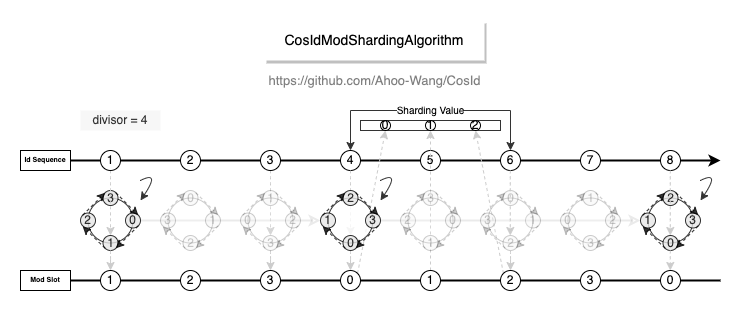
性能基准测试单值分片键(
PreciseShardingValue)算法复杂度:O(1)。范围值分片键(
RangeShardingValue)算法复杂度:O(N),其中N为范围值个数。
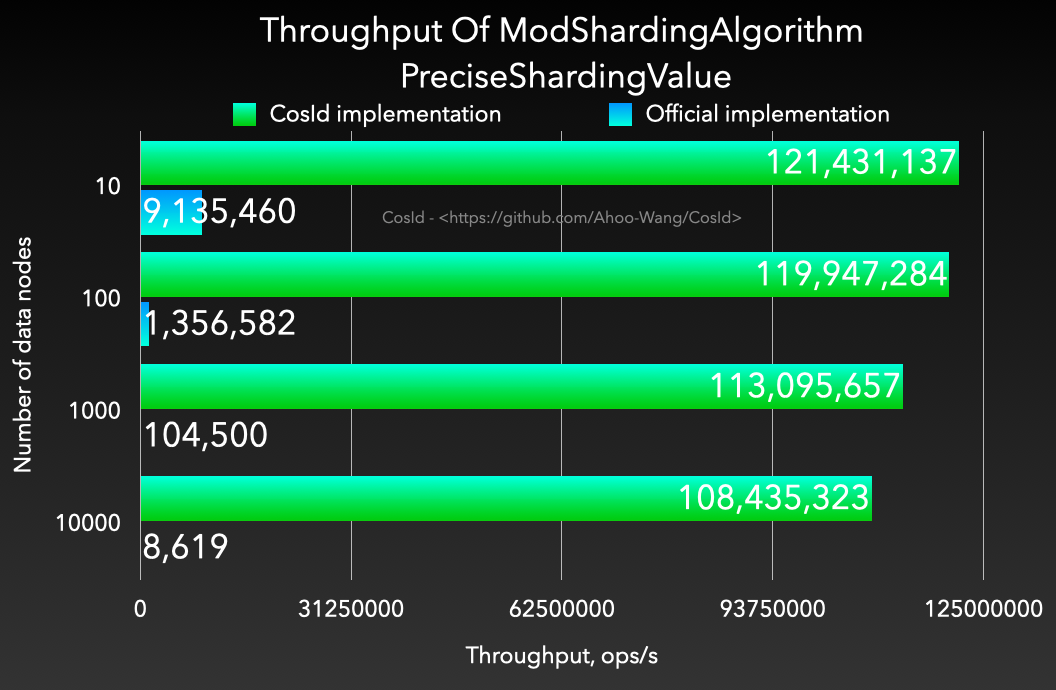
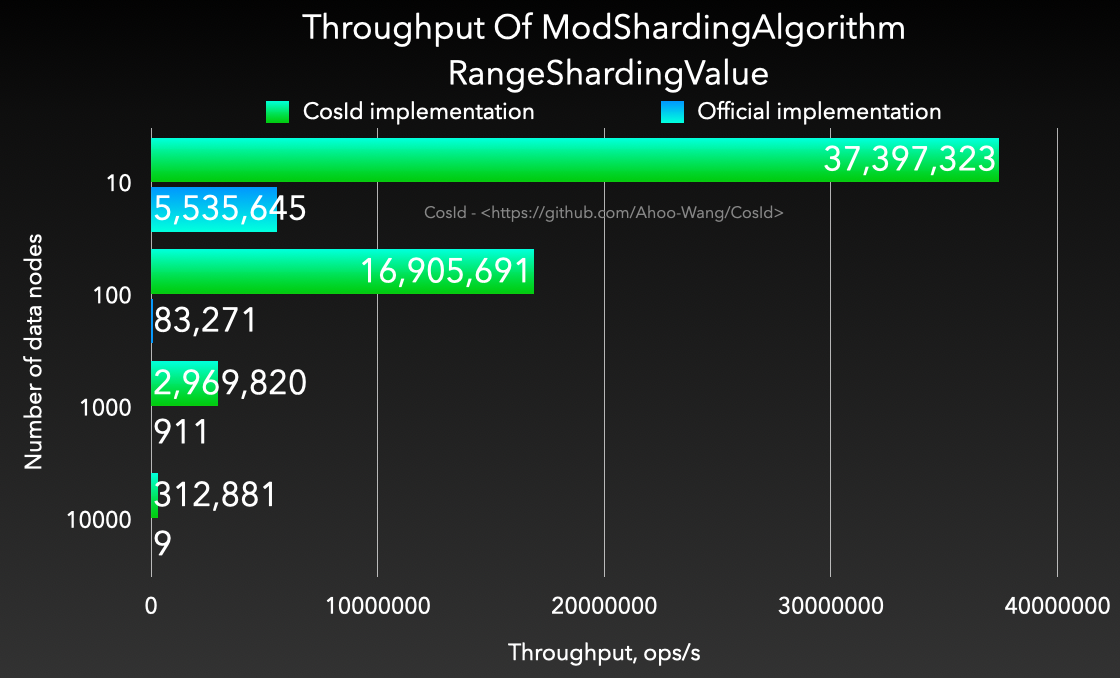 配置
配置
type: COSID_MOD
String
逻辑表/数据源名前缀
mod
int
除数
spring:
shardingsphere:
rules:
sharding:
sharding-algorithms:
alg-name:
type: COSID_MOD
props:
mod: 4
logic-name-prefix: t_table_
基于间隔的时间范围分片算法。
算法说明
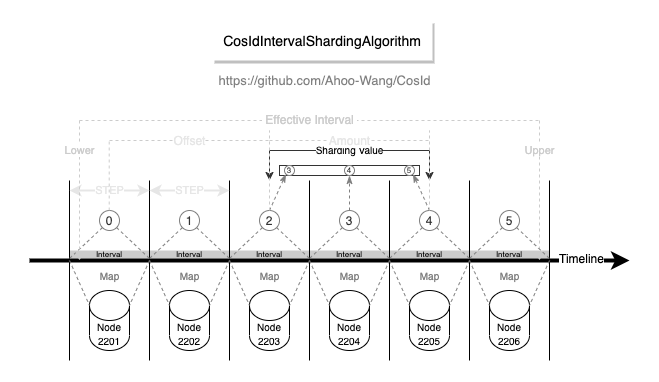
性能基准测试精确值/单值分片键(
PreciseShardingValue)算法复杂度:O(1)。范围值分片键(
RangeShardingValue)算法复杂度:O(N),其中N为范围值单位时间个数。
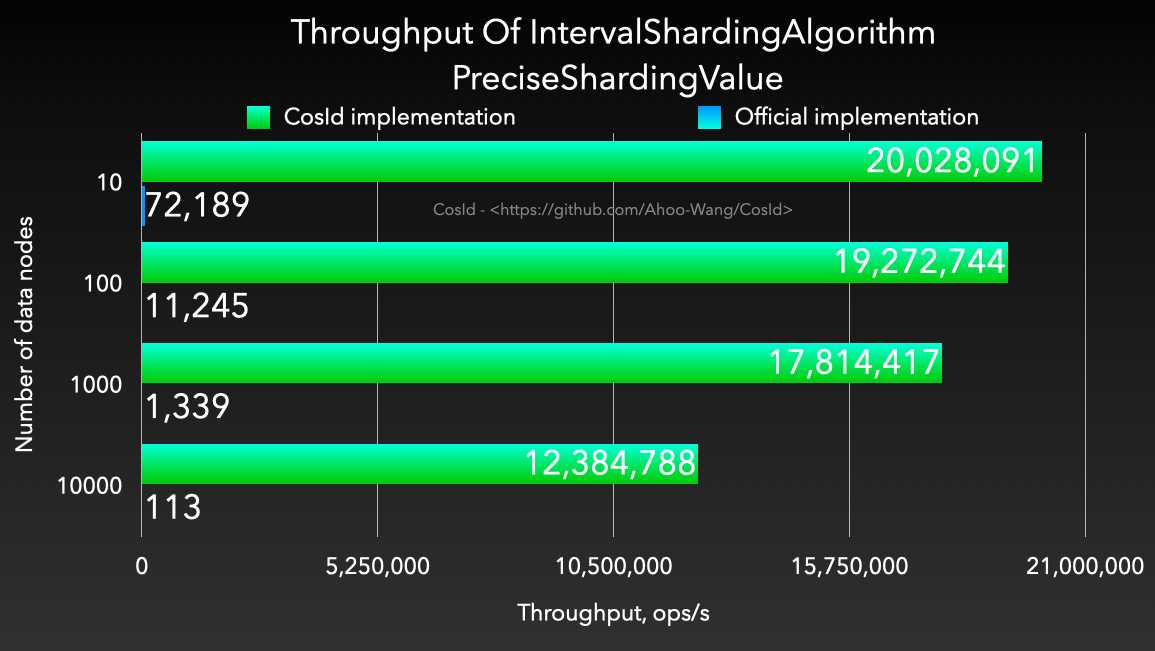
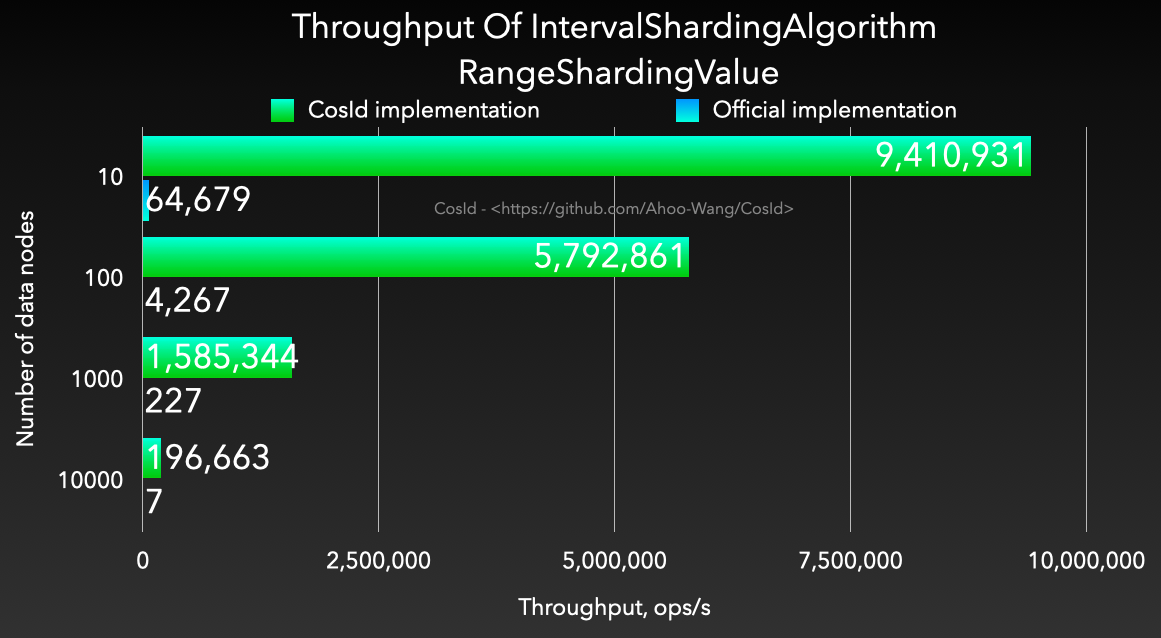 配置
配置
type: COSID_INTERVAL
String
逻辑表/数据源名前缀
datetime-lower
String
时间分片下界值,时间戳格式:yyyy-MM-dd HH:mm:ss
datetime-upper
String
时间分片上界值,时间戳格式:yyyy-MM-dd HH:mm:ss
sharding-suffix-pattern
String
分片真实表/数据源后缀格式
datetime-interval-unit
ChronoUnit
分片键时间间隔单位
datetime-interval-amount
int
分片键时间间隔
ts-unit
String
时间戳单位:SECOND/MILLISECOND
MILLISECOND
zone-id
String
分片键时区
ZoneId.systemDefault().getId()
spring:
shardingsphere:
rules:
sharding:
sharding-algorithms:
alg-name:
type: COSID_INTERVAL
props:
logic-name-prefix: logic-name-prefix
datetime-lower: 2021-12-08 22:00:00
datetime-upper: 2022-12-01 00:00:00
sharding-suffix-pattern: yyyyMM
datetime-interval-unit: MONTHS
datetime-interval-amount: 1
我们知道 SnowflakeId 的位分区方式,SnowflakeId 可以解析出时间戳,即 SnowflakeId 可以作为时间,所以 SnowflakeId 可以作为 INTERVAL 的分片算法的分片值。
(当没有CreateTime可用作分片时[这是一个非常极端的情况],或者对性能有非常极端的要求时, 分布式ID主键 作为查询范围可能是持久层性能更好的选择。 )
type: COSID_INTERVAL_SNOWFLAKE
String
逻辑表/数据源名前缀
datetime-lower
String
时间分片下界值,时间戳格式:yyyy-MM-dd HH:mm:ss
datetime-upper
String
时间分片上界值,时间戳格式:yyyy-MM-dd HH:mm:ss
sharding-suffix-pattern
String
分片真实表/数据源后缀格式
datetime-interval-unit
ChronoUnit
分片键时间间隔单位
datetime-interval-amount
int
分片键时间间隔
id-name
String
IdGenerator 的名称(在 IdGeneratorProvider 中已注册)
__share__
spring:
shardingsphere:
rules:
sharding:
sharding-algorithms:
alg-name:
type: COSID_INTERVAL_SNOWFLAKE
props:
logic-name-prefix: logic-name-prefix
datetime-lower: 2021-12-08 22:00:00
datetime-upper: 2022-12-01 00:00:00
sharding-suffix-pattern: yyyyMM
datetime-interval-unit: MONTHS
datetime-interval-amount: 1
id-name: cosid-name
本文主要讨论了分库分表产生的背景以及如何基于 ShardingSphere 可插拔架构集成 CosId 的应用实战。
ShardingSphere 采用可插拔架构,使得开发者非常方便的自定义满足自身应用场景的功能扩展,如果你也对参与 ShardingSphere 社区贡献感兴趣请参考 https://shardingsphere.apache.org/community/cn/contribute/contributor/ 。
相信很多小伙伴在阅读源码过程中总是难以自拔的遍历式以方法为单位一行行查看源码的实现细节,以至于迷失在细节中(如果你还能坚持下来,那真是佩服你的毅力之坚韧!)。这样的阅读方式是非常糟糕的、低效的。
阅读源码跟阅读书籍一样有非常多的相似之处:先建立一个概览图(索引),然后再逐层往下精进。(自上而下的方式更有利于阅读过程中不迷失在具体细节中)
推荐大家使用IDEA的插件 Diagrams 用于生成源码级别的概览图:UML类图。
引用说明
- IntelliJ IDEA: https://www.jetbrains.com/help/idea/class-diagram.html
- ShardingSphere 官方文档:https://shardingsphere.apache.org/document/current/cn/overview/
- IntelliJ IDEA: https://www.jetbrains.com/help/idea/class-diagram.html
- CosId-ShardingSphere: https://cosid.ahoo.me/guide/cosid-shardingsphere.html
